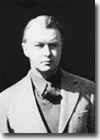| Our Publications | ||
| Books by Title | ||
| Books by Author | ||
| Books by Country | ||
| E-books | ||
| About | ||
| Orchid Press E-books | ||
| Distributed E-books | ||
| Our Bookshop | ||
| About Us | ||
| Browse Shop | ||
| How to Buy | ||
| Contact Us | ||
| WE BUY BOOKS AND LIBRARIES | ||
|
||
Profiles

Charles Ralph Boxer
An extract from the Preface of
Charles Ralph Boxer: An Uncommon Life-Soldier, Historian, Teacher, Collector, Traveller,
by Dauril Alden, Lisbon, 2001Charles Ralph (C.R.) Boxer was born on the Isle of Wight in 1904. On his father’s side, he was a descendant of an illustrious British family that had served in command positions in every British war since the French Revolution. While that family may have been of Huguenot origin, his mother’s hailed from Scotland. Her forebears became successful pastoralists in nineteenth century Tasmania and in Australia. As a young man who was the son of an officer who fell in France during World War I, Charles, like his elder brother, was destined to serve his country in its armed forces. Accordingly, he followed the customary progression from Wellington to Sandhurst and was commissioned in the British Army, but there he diverged from his colleagues, for he not only performed his military duties, he also became a respected scholar who initially specialized in the activities of the Portuguese and the Dutch in the Far East during the sixteenth and seventeenth centuries. In 1930. he fulfilled one of his ambitions when he was posted to Japan as a language officer. Having already studied French, Portuguese, Spanish and Dutch, he improved his working knowledge of Japanese there and, after a stint in the War Office, became a Japanese language intelligence officer in pre war Hong Kong. During the futile defense of Hong Kong he was severely wounded and was later convicted by a Japanese military court of a serious crime and sentenced to years at hard labor. Before his release at the end of the war, his illicit love match with his mistress became known around the world since it was featured in her best selling account of her adventures in China before and during the war. His reunion with the mother of his first daughter became the subject of newspaper articles from Hong Kong to New York City. One even depicted him as an international lover. His marriage to Mickey Hahn was celebrated by a national news magazine which displayed a full page article entitled “Boxer Makes an Honest Woman of Emily Hahn.” Although his military career ended soon after, Charles immediately began a new career as an academic. Despite the fact that he lacked the customary qualifications, he held chairs in leading universities on both sides of the Atlantic and lectured and taught at many others. Resuming his scholarly career, he broadened his interests to encompass a multitude of facets of Dutch and Portuguese imperial history from the early sixteenth to the beginning of the nineteenth centuries. By the time he put his pen down, he had written at least 335 books and articles and had given countless papers on five continents. Although his scholarship rested upon selecied use of a myriad of archives, much of it derived from the remarkable scholarly library of books, manuscripts, coins, and artifacts that he assembled. A relentless traveler, Charles Boxer garnered honors from Leiden to Macao, from Lisbon to Colombo. Throughout a remarkably industrious life that began in the 1920s and closed in the 1980s, Charles Boxer became one of Britain’s most illustrious scholars.
PO Box 70, Trinity TB, NL, A0C 2S0, Canada
Telephone: +1 709-330-4703